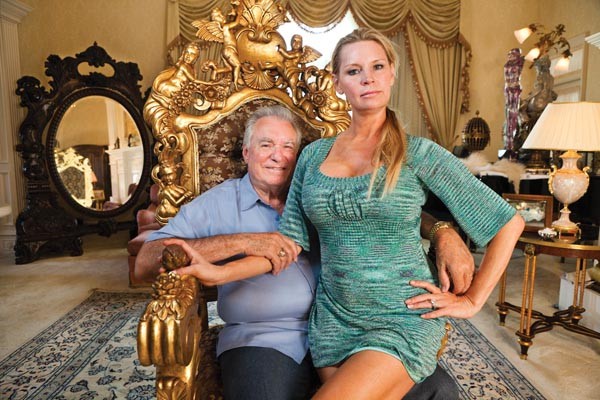The 2008 financial collapse resulted in several fascinating and occasionally infuriating documentaries. You can add Lauren Greenfield's The Queen of Versailles to the list, though its subject matter, profiling one American family caught in the mess, is considerably smaller.
"Small" is a joke, because the Siegels, of Orlando, Fla., live large. So large that Greenfield initially approached them in 2007 to document the construction of their dream home, a 90,000-square-foot pile that would be the country's largest private house. The money comes from David Siegel's timeshare empire, and much of the "design" (nine kitchens, 22 bathrooms, indoor skating rink) from his third wife, a former model named Jackie. The home — "Versailles" — is somewhat modeled after Louis XIV's palace, though the Siegels admit the Paris casino in Vegas was also a major influence.
When Greenfield begins her film, Versailles is two-thirds complete, and the Siegels bubble with enthusiasm for their super-sized lifestyle. They are living the American Dream, having transcended their modest backgrounds.
But in fall 2008, their high life crumbles. The timeshare business — built on easy credit — dries up, and the Siegels go broke. Among the collateral damage: a pet lizard and a dozen staff. (Jackie expresses regret at having eight children, now that there's only one nanny left.) The family dogs run amok in the increasingly messy house, eating off tables and pooping on the floor.
One-percenter Siegel isn't a villain. Talking "mooches" into timeshares is no crime, and the pitch is such sweet promise: If you can't be rich, "the next best thing is to feel rich," by spending money. Ultimately what's so fascinating about Queen is what it reflects about many of us. The Siegels aren't alone in living beyond their means, taking immediate pleasures with no regard for the future, equating possessions with value or feeling blameless when the bottom eventually drops out. These are the failures of many Americans, only here writ especially large and sparkly, and drenched in irony — Siegel's wealth comes from our aspirational desires.
While there are moments in Queen to gasp at the Siegels' tacky extravagances, the film doesn't automatically vilify them. Jackie, though flighty and deluded, is likable, and makes efforts to live more economically. (She re-gifts!) The paterfamilias turns cranky, revealing some reflective candor but also a stubbornness toward adapting. The entire family, in its own way, struggles without the easy money that papered over emotional breaches with spending sprees and cushioned lax parenting. My favorite post-crash scene: Dad, gloomily sequestered amid banker's boxes, nastily carping at the wife and kids for leaving too many lights on in their 29,000-square-foot home.
















